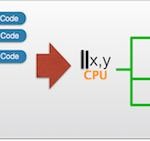In this video from the I4MS Event in Berlin, Michel Pottiez presents: Cloudflow – The CFD Experiment.
Archives for July 2014
Job of the Week: Scientific Programmer at Boise State
Boise State University is seeking a Scientific Programmer in our Job of the Week.
This Week in HPC: Intel Maps Omni Scale Future and IBM Moves InfiniBand to the Cloud
In this episode of This Week in HPC, Michael Feldman and Addison Snell from Intersect360 Research discuss the new Intel Omni Scale Fabric as well as IBM’s plans plans to add an InfiniBand high-speed data transfer option to its SoftLayer cloud before the end of the third quarter of 2014.
Video: Pathways to Exascale N-body Simulations
In this video from the Exascale Computing in Astrophysics Conference, Tom Quinn from the University of Washington presents: Pathways to Exascale N-body Simulations.
Nvidia Salutes Women Who CUDA
This week Nvidia salutes Women who use CUDA for incredible science and engineering. They’ve compiled 30 profiles so far, and the advice they share from their experiences is quite inspiring. “It’s a good way to remind people that women write code, participate in open-source projects, and invent things,” said Lorena Barba from George Washington University. “It’s important to make the technology world more attractive to female students and show them examples of women who are innovators.”
Porting to Accelerators with Hybrid Fortran
Over at Typhoon Computing, Michel Müller writes programmers looking to port their code to accelerators now have a new tool called Hybrid Fortran. “This python-based preprocessor parses annotations together with your Fortran code structure, declarations, accessors and procedure calls, and then writes separate versions of your code – once for CPU with OpenMP parallelization and once for GPU with CUDA Fortran.”
New Approaches to Energy Efficient Exascale
“As displayed at ISC’14, DEEP combines a standard InfiniBand cluster of Intel Xeon nodes, with a new, highly scalable ‘booster’ consisting of Phi co-processors and a high-performance 3D torus network from Extoll, the German interconnect company spun out of the University of Heidelberg.”
Georg Hager Interview on the Parallel Universe Computing Challenge
Over at the Data Stack, Mike Bernhardt has posted an interview with Georg Hager, who lead Team Germany to victory in the Intel Parallel Universe Computing Challenge at SC13. People are interested in performance, that’s why they attend SC (mostly). But there is such little competition outside the academic peer review that an idea such as […]
What Makes the SuperMUC so Super?
Robert Roe from Scientific Computing World visited the LRZ facility to find out what makes SuperMUC ideal for academic research projects.
Supercomputing the Dopamine Transporter
Over at TACC, writes that researchers are using the Stampede supercomputer to study a common link between addiction and neurological disease.











